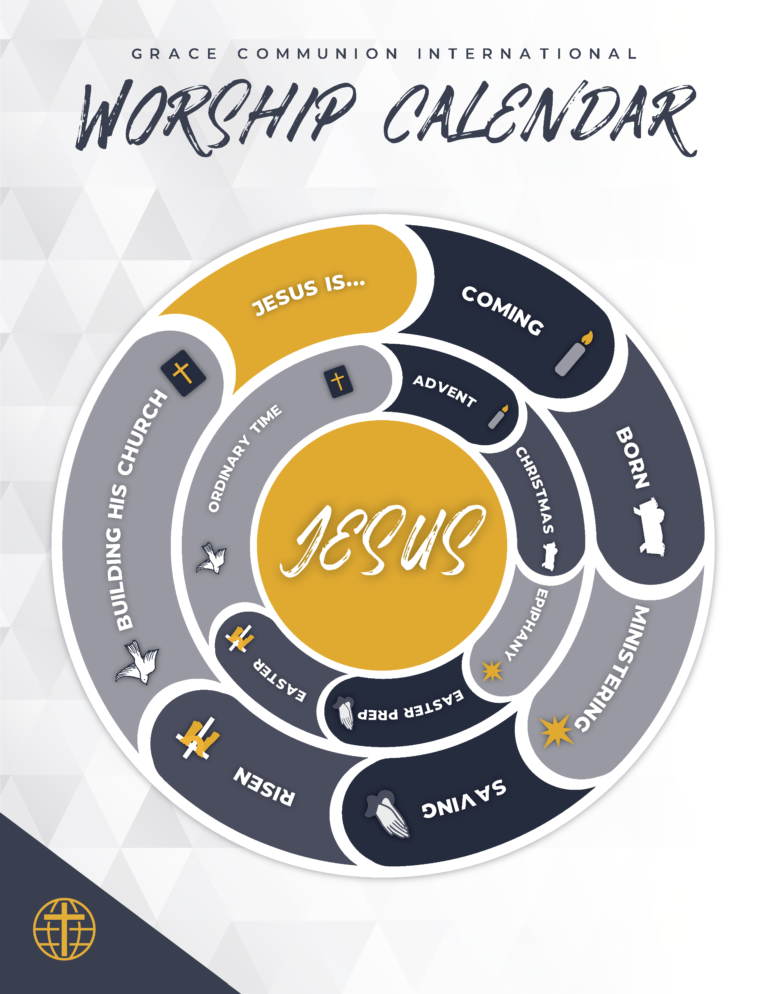God’s clock—centered on Jesus—determines how we set our life clocks.

By Emmanuel Okai, West Africa Regional Director, National Director, Ghana & Church Pastor Akim-Oda, Ghana
In the diagram produced by GCI that shows the annual cycle of Christian worship activities and themes, we see the name of Jesus Christ in the inner center. There is a theological reason for that central location of Christ in Christian worship.
God, the Creator, wants mankind to seek him diligently[i] and to worship him in spirit and in truth[ii]. He desires that humanity will come to know him as he truly is.[iii] For that reason, the New Testament Scriptures make it clear that God became human in order to bring humanity back to himself. That the man Jesus Christ of Nazareth is God incarnate is the consistent theology of the New Testament.[iv]
When Paul had the opportunity to speak at the Areopagus, the apex court of Athens in his day, he pointed to the centrality of Jesus in the ultimate plan of God for the redemption of humanity. Paul taught the Athenians that the “Unknown God” who is creator of all things[v] and the One in “whom we live, move and have our being”[vi] has “appointed a day on which he will judge the world in righteousness by the man whom he has ordained. He has given assurance of this to all by raising him from the dead.”[vii]
The pre-eminence of Jesus Christ is so abundantly demonstrated in the Bible that most Christians take it as a given— self-evident truth of Scripture. A few Scriptures will demonstrate this fact:
- Ephesians 1:10—In the fullness of times all things will be gathered together in Christ.
- Philippians 2:9-11—Every knee will bow and every tongue will confess that Jesus is Lord.
- Colossians 1:27—Christ in you is the hope of glory, a mystery now revealed to humanity.
- Colossians 1:19-20—God is reconciling all things, in heaven and on earth, through Christ.
- John 3:16—Salvation and eternal life is received through faith in Jesus Christ.
Practically, what is our response to the pre-eminence of Christ?
- Our first public declaration is to confess that Christ is our Lord and Saviour.[viii]
- Next, we publicly declare our “death” and “resurrection” with Jesus through baptism. [ix]
- Our regular sacrament of holy communion is to remember (proclaim) what Jesus’ death means for all.[x]
- The way of the Christian life is to imitate Jesus Christ, God incarnate.[xi]
It begins with a focus on our true identity. Who are we in Christ?
- Acts 17:28—It is in God (Father, Son, and Holy Spirit) that we really exist. Therefore, without God our lives’ endeavours are meaningless, vanity and chasing after the wind.[xii]
- Colossians 3:3-4—Due to our “death” with Christ, our real life is hidden in Christ; and we are looking forward to the revelation of the new life at Christ’s second coming. Therefore our life cycles must be mediated through the larger cycle of Christ—our hope of glory.
- Galatians 2:20—Paul wants us to regard our lives as non-existent and to allow Christ to live his life in us. Therefore, his celebrations should over-shadow ours; remembrance of his life story must be prominent in our lives’ priorities.
The clock analogy
There are often three arms / hands on an ordinary clock – seconds, minutes and hour. The first time a child sees the clock, her attention will most often be arrested by the fascination of the rapid movement of the seconds hand. She probably won’t notice the slow movement of the minute hand; and certainly won’t perceive the much slower crawling of the short hour hand. However, the movement of the seconds hand is meaningless if its movement is not in relationship with the other two. Can you imagine a clock with only the seconds hand jogging around the face? It might be useful for measuring a few things, but not for telling the time of day.
Similarly, our story has meaning only within the bigger divine story. Our life’s cycle of birth, marriage, work, achievements, failures, retirement, old age and death have meaning only if they are synchronized within the clock of God’s plans and purposes. When we rush around in our little corners of the earth within the limitless universe oblivious of the grand agenda of the Creator God, in whom we live, move and have our being, then our 70 to 120 years become like vapor. As humans, and more importantly as Christians, we need to understand that our story becomes meaningful only in context of the bigger story that God is working out through Jesus Christ, whom we recognize as Lord and Master. The GCI Worship Calendar helps us stay within that context.
The GCI Annual Worship Calendar keeps us focused on God’s story by focusing on Jesus—his birth, his life, his death, his resurrection, his ascension, his identity, and his church as well as his promised second coming.
- His birth (Christmas)
- His life (Epiphany)
- His love for the world (Palm Sunday)
- His passion – suffering and death (Maundy Thursday, Good Friday, Holy Saturday)
- His resurrection (Easter/Resurrection Sunday)
- His ascension (Ascension Sunday)
- His body—the church (Pentecost)
- His identity (Trinity Sunday)
- His return (Christ the King Sunday)
Not only does the GCI Worship Calendar keep us focused on God’s story, it also gives us several reminders in worship and church life.
- It reminds us that we are not our own; we have been bought at a price by God.[xiii]
- It makes us remember that God loves us to the point of coming down to tabernacle with us
- It retells the story, every year, of how we are saved because of the love of God for us.
- It reminds us that there is something greater than our personal, national or earthly priorities
- It places our current story in context and in the right (eternal) perspective[xiv]
In his article entitled, “Focusing on Hope,, Equipper Editor, Rick Shallenberger, pointed out that our GCI Worship calendar ensures that “we acknowledge, through worship, preaching, and living, that Jesus is the center of the center.” His “central clock” must be the one we use to set our tiny life clocks.
[i] Hebrews 11:6
[ii] John 4:23 – 24
[iii] John 17:1 – 3; Jeremiah 9:23 -24
[iv] Matthew 1:20 – 23; John 1:1 – 14; Hebrews 1:1 – 4
[v] Acts 17:22 – 24
[vi] Acts 17:28
[vii] Acts 17:31
[viii] Romans 10:9 – 10
[ix] Romans 6:3 – 4
[x] 1 Corinthians 11:26
[xi] 1 Corinthians 11:1; 1 John 2:6; 1 Peter 2:21
[xii] Ecclesiastes 1:2, 14; Ecclesiastes 12:13 – the whole book makes this point that without our recognition of God all human endeavour amounts to nothing in the ultimate sense.
[xiii] 1 Corinthians 6:19 – 20
[xiv] Romans 8:18, 28




Thanks for the article Emmanuel. I was fascinated to think about how much of my focus is on the second hand in my world. When I do that, I miss so much about the context in which that rapidly moving second hand travels. Thanks for the reminder to lift my eyes to the one who holds my context in his hands.
Emmanuel, I found your clock analogy both thought provoking and helpful. Thank you very much.